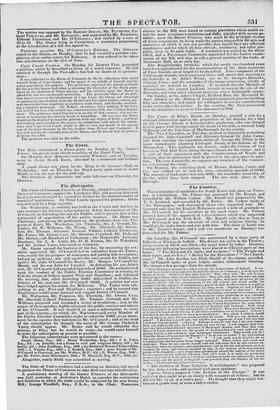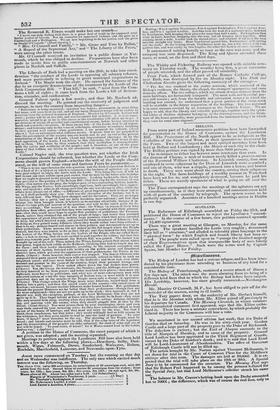On Saturday, Mr. O'Connell was entertained by a large party
of Liberals at Bungay, in Suffolk. The dinner was given in the Theatre ; every corner of which was filled—the upper boxes by ladies. Banners, bearing the following inscriptions, were placed in different parts of the
house. " The King and his rights, and no more ;" " The People and their rights, and no less ;" " Relief for the Dissenters ;" " No Church- rates." Mr. John Garden, late High Sheriff of the county, presided. Mr. O'Connell spoke at great length, amidst enthusiastic cheering. We extract a few passages from his speech. wen. Ministers brought in a bill to reform the Corpor diens of Ireland. It wa carried by overw twitting majorities through the House of Commons ; it went up to the House of Lords. n hat bare they done is ith it ? Why, they said, • We will de,troy these Corporations—they are too bad to exist.' They said this, but they have not done it ; for, although they have destroy eft Corporate rights. they have preserved all the corporate oflieers—all the paraphernalia of the old system, rind would saddle the country with the expense of maintaining is parcel of men in offices where it %%mid be utterly impossible that they should have any thing to do. Suppose we had a Parlia- ment in Ireland. does ar,y one suppose they would dare to treat us that way? If we gave op our native: Parliament, it was in the expectation, and tinder the assurance, that we should receive from the Imperial Parliament the same protection as was extended to other parts of the kingdom. We roust indeed be looked upon as the basest of wretches if we had consented to the degradation of civing, up our Parliament without a solemn assurance that we should obtain from the United Legislature the same rights and privileges as were enjoyed by the people of England and Scotland. Well, a kat have the Lords d ne with corp irate property in Ireland ? They have thrown the whole or it into the hands of the Crown. Is not that a scandalous act of tyranny ? (Cheers.) Hut that is not the worst of it—they have insulted us. You whom I address would bear an injury as men, but you would not hear an insult. Will you see Ireland in- sulted? I feel that you will not: but whether you support me or not. I tell you that I sill not bear the insult. (Cheers.) Perhaps it maybe said that I am over violent. Now you shall be the jury, awl I will state my case to you. I will suppose that Scot- land and Ireland had obtained measures of Municipal Reform, and then that very Howe of Lords should tell yon the people of England that you were unfit and un- worthy to have a like reform in your municipal institutions. What would you do ? Turn the House of Lords into the Thames (" To be sure nrc would!") Ay. and without any very great loss of time( • • • I call upon you to stand by me to see that justice and humanity be no longer outraged. These scenes silt, must, and shall end. Then let me console myself with the reflection, that as this country ex- ceeds every other in commerce and manufactures, and in the arts and sciences, as it is excelled by none, and scarcely equalled by any, in the bravery of its suns and the purity of its ilaughters.—as it stands thus preeminent amonst the nations of the scald, let console myself with the reflection, that all I want is to make its prosperity greater, to elevate it to the pintriee of glory, and thus to make war unnecessary, peace more secure. and the ;HMO' of England wore iv-meant than the thunder of the ele- mmits." (bald and luny cent ;sued chetring.)
" The abolition of State Religious Establishments " was proposed by Mr. John Childs, and received with great applause.
Captain Money proposed "the Reform of the Peerage." It was said that they ought to go on slowly with measures of reform ; but he did not like to go at a snail's pace. Ile thought that they might ven- ture on a gentle trot, or even a lady's canter.
The Reverend R. Elwyn would make but one remark-
., I never eau help feeling that there is a great deal of truth In the supposed retri- butive justice of heaven. For six centuries we oppressed Ireland, and she gave us a Castlereagh and a Wellington. We are now beginning to do her justice, aud she gives els Daniel O'Connell." (Great cheering.)
" Mrs. O'Connell and Family," " Mr. Grote and Vote by Ballot," " A Repeal of the Septennial Act," and "The Liberty of the Press," were among the other toasts. Mr. O'Connell received an invitation to a public dinner at Yar- mouth, which he was obliged to decline. Preparations have also been made to invite him to public entertainments at Norwich and other places in Norfolk and Suffolk.



























 Previous page
Previous page